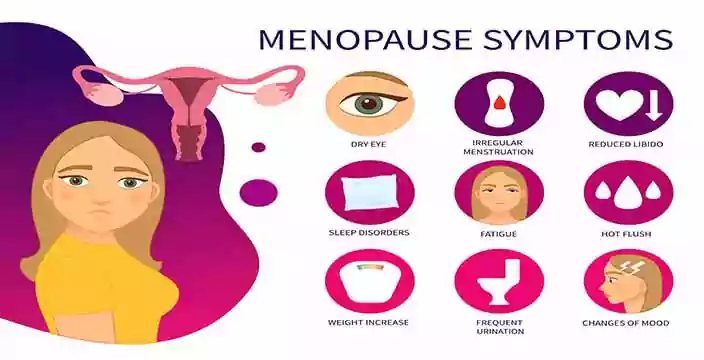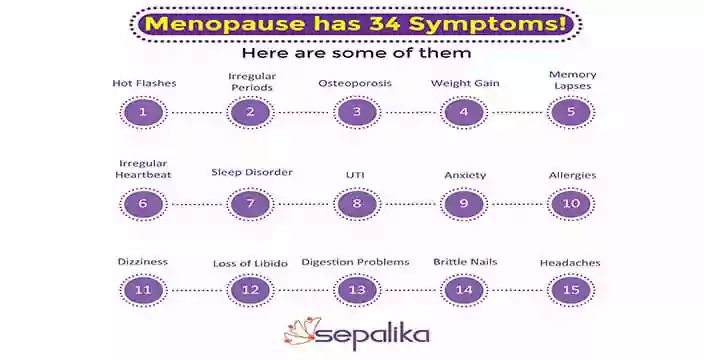
Menopause
The Complete List of Menopause Symptoms (all 35 of them!)
Apr 27, 2017For any woman, menopause is a natural part of aging. With time, the ovaries reduce production of sex hormones, estrogen and progesterone, leading up to menopause. Menopause officially marks the end of female fertility and menstruation, and it should not be considered as an illness or disease.
Despite being a natural biological process, menopause can present itself with some drastic changes in hormonal stability, leading to a variety of symptoms – ranging from mild to severe.
However, menopause rarely occurs suddenly. As a woman, you can begin noticing these symptoms 8 to 10 years before menopause actually occurs. Most women begin experiencing these symptoms in their 40s, but it is not uncommon these days to start as early as mid-30s. This phase, during which you begin to notice symptoms of menopause, but you still have irregular periods, is termed as perimenopause.
A Word on Perimenopause
Medically, menopause is defined as a time when a woman has not had her menstrual period for at least 12 consecutive months (or a year). The period before menopause, when you begin noticing signs of hormonal changes, is defined as perimenopause. During this phase, the ovaries gradually produce lesser estrogen, and your periods may move become farther apart from each other. On the other hand, some women may notice irregular periods that come closer together and do not follow their previous pattern of being 25-40 days apart. To put it simply, when you experience perimenopause, your periods become difficult to predict. You may also experience heavier or lighter flow, or notice more blood clots during perimenopause.
Menopause will kick in when your ovaries produce so little estrogen than it no longer leads to the release of a healthy egg from your ovaries, to trigger menstruation after 14-16 days. Remember, if your last period was less than a year ago, you are not fully menopausal yet, and could still become pregnant. We discuss the various symptoms of perimenopause in a different article, so give that a read too.
The Complete List Of 35 Symptoms Of Menopause

Some symptoms of menopause can occur years before a woman experiences her last period, while others can last for years afterwards as well. Since hormones vary from one woman to another, menopause affects all women differently. Some may experience very few symptoms while others could experience most of them. Symptoms can also vary in frequency and severity.
So, what are these symptoms that signal menopause is upon you? Let’s talk about all the 35 symptoms of menopause to look out for.
Irregular Periods
Irregularities in your menstrual cycle can happen any time through life for a bunch of different reasons. However, if you are in your 40s and notice irregularities in the pattern of your usual menstrual cycle, this could be one of the first signs of menopause. The reason is the declining levels of estrogen and progesterone in the body, which can cause your periods to become more frequent or more spaced out, and also present itself as changes in period flow.
Hot Flashes
One of the most common symptoms of menopause, a hot flash causes a sudden feeling of intense heat, resulting in sweating or chills. It can create flushing or redness of the face and neck and make you feel uncomfortably hot, which is not always related to external factors and temperature. If you want to read about why they happen and how you can tackle them.
Night Sweats
Are your hot flashes more frequent during the night? If you wake up sweating profusely and feeling extremely hot in the middle of the night, these hot flashes are called night sweats. They can interfere with your sleeping pattern, adding to stress and fatigue during daytime. Caused by the same hormonal imbalance, night sweats can be improved by wearing airy cotton pyjamas and changing bed linen to cotton.
Fatigue

Feeling sluggish and tired all the time? If you feel fatigued despite spending 8 hours in bed every night, this could be another symptom of menopause. Menopause-related fatigue can affect productivity, sleep quality and mood, increasing your stress levels.
Lapses in Memory
If you notice yourself becoming more forgetful, this could be another temporary sign of menopause. Diminishing levels of estrogen and progesterone can result in memory loss as well as foggy thinking. Also, the additional fatigue brought on by menopause doesn’t help! Most women find that their memory improves as they transition completely into menopause.
Inability to Focus
Along with memory lapses, fluctuating hormone levels can also cause difficulty in concentrating or focusing during menopause. You will likely notice these symptoms during the early phases of perimenopause. However, poor sleep and mood swings can also be contributing factors.
Vaginal Dryness
The natural decline in estrogen levels during menopause can make vaginal tissue become dryer and thinner. This vaginal dryness the tissue becomes more easily irritated and more susceptible to infections as well.
Loss of Libido
Changing hormone levels can decrease sex drive. For some women, this can be caused by vaginal dryness, as sex becomes painful. However, the primary reason behind low libido is declining levels of sex hormones.
Urinary Tract Infections (UTIs)
Frequent UTIs are another sign of menopause. As vaginal tissue becomes dryer and thinner, it becomes more susceptible to bacterial infections. Weakening of vaginal walls with waning levels of estrogen allows bacteria easier access to the bladder, leading to urinary tract infections that could affect the bladder. The ureters and kidney too can be affected at times.
Urinary Incontinence
Falling levels of estrogen during menopause can cause thinning of the urethra and urinary bladder. You may notice you have to use the bathroom more frequently. Sometimes, weakened pelvic muscles can also cause urinary leakage when you laugh, sneeze, cough, lift something heavy, or during rigorous activity. Menopause can also cause overflow incontinence wherein you might lose sensation of a full bladder, leading to accidental urination. Regular exercises, particularly Kegel exercises, can help strengthen pelvic muscles.
Bloating

Noticing more bloating? As estrogen levels fluctuate throughout perimenopause, this may lead to water retention. When tissues hold on to water, it causes bloating that comes with a feeling of fullness, heaviness and tightness around the belly.
Thinning of Hair

Low levels of estrogen can cause more hair to fall and also lead to thinning of hair. Healthy hair follicles need estrogen for growth. So when levels of estrogen start to deteriorate, your hair tends to become dryer, brittle and susceptible to breakage.
Brittle Nails

Estrogen is vital not just for the health of your hair but also nails. Low levels can cause brittle nails as they become weaker and dryer. It is best to keep your nails short and use a hand cream regularly.
Sleep Disturbances

Many women experiencing menopause report sleep-related disturbances as a symptom. This could be night sweats, insomnia, sleep-disordered breathing or a sense of anxiety, all of which disrupt a healthy sleep pattern.
Dizzy Spells
Fluctuating hormone levels can also cause dizziness. These spells come suddenly and could pass in a few minutes or even become extended. If you are feeling more dizzy than usual, be aware of the risk of falling or accidents when driving or operating machinery. Avoid bending down or rising suddenly, since this period of life is associated with orthostatic hypotension or low blood pressure caused by sudden changes in posture.
Mood Swings
As with PMS, menopause comes with its own set of mood swings. Fluctuating levels of sex hormones affect neurotransmitters in the brain – like serotonin and GABA, making you more irritable. Your mood swings could become more frequent as hormones are out of balance, adding to your stress levels.
Panic Disorder
For some women, imbalances in hormones during menopause can manifest as panic disorder as well. You may notice debilitating emotional episodes that come out of nowhere, accompanied by rapid heartbeat, irrational feelings of dread, anger and sadness, extreme terror and shallow breathing.
Anxiety
Dopamine and serotonin are neurotransmitters that play a crucial role in regulating mood. A decline in estrogen levels during menopause can interfere with the production of these neurotransmitters, which can lead to anxiety. If you notice you can’t seem to relax or find calm, it’s best to talk to your medical professional. You can also add deep breathing exercises to your daily regimen, as it is one of the most researched interventions to help with menopausal symptoms.
Depression

As progesterone and estrogen levels fall during menopause, these hormonal changes bring with them a myriad of unpleasant side effects, which can negatively impact quality of life for some women. Add to that anxiety, mood swings, sleep disturbances and fatigue. This makes many menopausal women more susceptible to depression. Therapy and alternative treatments can help improve quality of life, treating depression in the process.
Insomnia
Menopause related insomnia is usually a direct effect of hot flashes, night sweats, panic disorder or anxiety. However, low levels of progesterone can also contribute to poor sleep, even when you don’t experience night sweats or anxiety. Many menopausal women report an inability to fall asleep after retiring to bed or waking up at 3 or 4 am in the morning and then being unable to go back to sleep. These disturbances are caused by the way that falling oestrogen and progesterone affect the hormone adrenaline.
Weight Gain

Is your favourite pair of pants suddenly too tight? Menopause related weight gain can come on suddenly and surprise many women. Hormonal imbalances can lead to unexplained weight gain as well as loss of muscle mass. Many women notice this weight gain around the belly. This is why a healthy diet and regular exercise plan are very important for menopausal women. Researchers have found that eating the right diet and getting the right amount of moderate exercise seems to help this problem better than crash dieting and intensive exercise that many women resort to, at this age. The sudden weight gain often scares women into going overboard, especially on exercise, and this can worsen the situation.
Frequent Headaches
Many menopausal women experience frequent headaches, which are linked to waning levels of estrogen. These headaches might be mild to begin with, but can become more intense as hormone levels continue to drop with advancing menopause.
Sensation of a Burning Tongue
Fluctuations in estrogen levels can cause a sensation of burning in the tongue, gums, lips or inner cheek. You may also notice pain or a metallic taste in the mouth throughout menopause.
Digestive Issues
Estrogen and cortisol levels go hand in hand. Lower estrogen lowers the buffer against the stress hormones of cortisol and adrenaline. Higher levels of cortisol in the blood signal to the brain that you are in danger, leading to non-essential functions like digestion being temporarily stopped, upsetting your digestive routine. You could experience abdominal pain or discomfort, constipation, bloating and other digestive problems while your hormones are out of balance.
Muscle Tightness
Menopause can also be the reason behind muscle tension. Changing hormone levels can cause muscles in the back, neck and shoulders to tighten or strain. You may also experience muscle stiffness, soreness and aches throughout your body.
Joint Pain
Declining estrogen levels during menopause can contribute to joint pain. It is known to most women that menopause can lead to weaker bones due to declining bone density. This is often due to lower levels of oestrogen. The lowered bone mass and density when combined with muscle tightness and increased inflammation, can lead to serious joint pains. Many menopausal women complain of tightness in hips, soreness in knees, and joint swelling or fingers and toes.
Allergies
Suddenly find yourself sniffling in the allergy season? Hormonal fluctuations can weaken your immune system, making you more prone to seasonal allergies. From sinus infections to rashes, itchy eyes, swelling and sneezing, menopause can exacerbate allergy symptoms.
Body Odour Changes
If you experience frequent hot flashes, chances are that you’ve noticed changes in your body odour. Menopause can affect a woman’s natural scent. Excessive sweating can lead to bad body odour, making good personal hygiene extremely important.
Itchiness
With age and changing hormone levels, collagen production slows down. As collagen is crucial for maintaining moisture and elasticity in skin, menopausal women may experience more skin dryness, irritation and itchiness.
Osteoporosis
Estrogen is vital for not only your sexual health but also for maintaining bone density. Estrogen is crucial for preventing bone resorption, and waning levels throughout perimenopause can accelerate bone loss. Many menopausal and post-menopausal women are at high risk for osteoporosis, which is characterised by decrease in bone mass and density, as well as weakening of bones. This is why eating a balanced calcium-rich diet and engaging in moderate intensity weight-bearing exercises is so important to retain bone density as you transition into menopause.
Irregular Heartbeat
Falling estrogen levels can sometimes overstimulate the circulatory and nervous systems. This may cause irregular heartbeat, heart palpitations and/or arrhythmia. If you experience these symptoms, report them to your doctor immediately.
Breast Pain
Did your breasts often feel sore around your periods? Fluctuating hormone levels can cause breast tenderness and soreness, and these same fluctuations can also cause breast pain during menopause. You may experience pain or soreness that is unpredictable and unrelated to menstrual cycle.
Changes in Breast Tissue
Fluctuating hormone levels can also cause changes to your breast size and shape. As estrogen levels drop and your breast milk system begins to shut down, changes occur in glandular tissues of the breast. Your breasts may shrink or change in size and shape. They may feel less dense and tend to sag.
Tingling Sensation
Many women going through menopause notice a sensation of tingling, burning or numbness in their extremities – fingers, toes, feet, hands, arms and legs.
Electric Shock Sensation
Suddenly felt like an electric shock went through your body? A sensation very similar to that of a rubber band snapping between muscle and skin can occur just before a hot flash. Though brief, these can be quite unpleasant and can warn you of an impending hot flash.
So there you have it – an exhaustive list of all the symptoms of menopause. Don’t be scared after reading this. You’ve got to be really unlucky to experience more than a few of these symptoms yourself. It’s just that no two women are alike, and different women face different symptoms, so we have tried to do a thorough job of listing all of them. The good news – if you are experiencing some (or several) of these distressing symptoms of menopause, there are several natural, effective treatment options available for a hormone-free menopause. The Sepalika Menopause programme is a completely holistic programme that helps you transition into this phase of life with the least difficulty. Wish you vibrant health and well-being.
Sepalika’s Natural Menopause Treatment Program
The Sepalika Menopause Programme is scientifically designed to help women deal with all the other symptoms of peri-menopause and menopause. Each person’s treatment is tailor-made as per their symptoms, medical history and lab test results. Progress is tracked till you get better and expert supervision is available throughout the programme. Write to us at health@sepalika.com for more information and to speak to a Health Coach today! Note: Program open only to people in India
This article has been co-authored by Maneera Saxena Behl, a health and fitness who likes to help others improve their overall well-being by achieving the right balance between nutrition, exercise and mindfulness.




